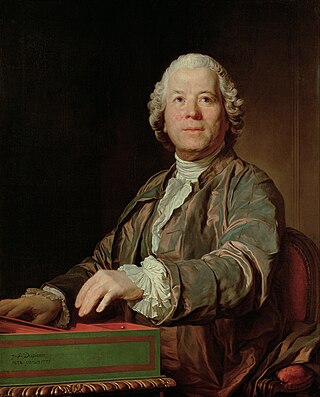
Christoph WillibaldGluck was a composer of Italian and French opera in the early classical period. Born in the Upper Palatinate and raised in Bohemia, both at the time part of the Holy Roman Empire, he gained prominence at the Habsburg court at Vienna. There he brought about the practical reform of opera's dramaturgical practices for which many intellectuals had been campaigning. With a series of radical new works in the 1760s, among them Orfeo ed Euridice and Alceste, he broke the stranglehold that Metastasian opera seria had enjoyed for much of the century. Gluck introduced more drama by using orchestral recitative and cutting the usually long da capo aria. His later operas have half the length of a typical baroque opera.
Iphigénie en Tauride is a 1779 opera by Christoph Willibald Gluck in four acts. It was his fifth opera for the French stage. The libretto was written by Nicolas-François Guillard.

Opera seria is an Italian musical term which refers to the noble and "serious" style of Italian opera that predominated in Europe from the 1710s to about 1770. The term itself was rarely used at the time and only attained common usage once opera seria was becoming unfashionable and beginning to be viewed as something of a historical genre. The popular rival to opera seria was opera buffa, the 'comic' opera that took its cue from the improvisatory commedia dell'arte.

La clemenza di Tito, K. 621, is an opera seria in two acts composed by Wolfgang Amadeus Mozart to an Italian libretto by Caterino Mazzolà, after Pietro Metastasio. Mozart completed the work in the midst of composing Die Zauberflöte, his last opera. La clemenza di Tito premiered on 6 September 1791 at the Estates Theatre in Prague.
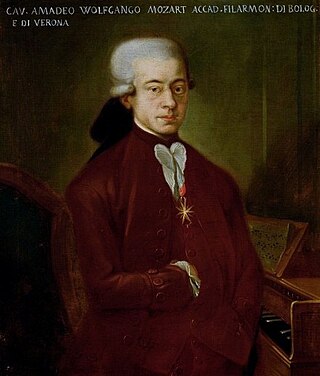
Il re pastore is an opera, K. 208, written by Wolfgang Amadeus Mozart to an Italian libretto by Metastasio, edited by Giambattista Varesco. It is an opera seria. The opera was first performed on 23 April 1775 in Salzburg in the Rittersaal of the Residenz-Theater in the palace of the Archbishop Count Hieronymus von Colloredo.

Dardanus is an opera by Antonio Sacchini. It takes the form of a tragédie lyrique in four acts. It was first performed at Versailles on 18 September 1784, and subsequently at the Paris Opera on 30 November of the same year. The French-language libretto was adapted by Nicolas-François Guillard from that by Charles-Antoine Leclerc de La Bruère, which had already been set to music by Jean-Philippe Rameau in his earlier opera of the same name.
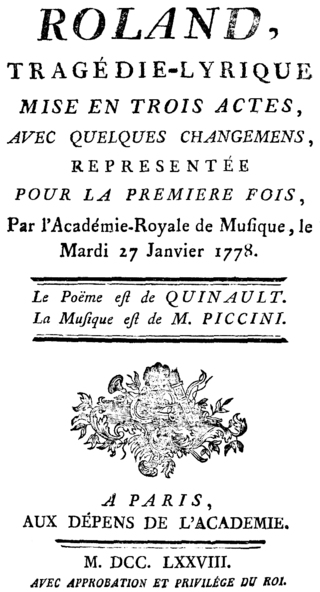
Roland is a tragédie lyrique in three acts by the composer Niccolò Piccinni. The opera was a new setting of a libretto written by Philippe Quinault for Jean-Baptiste Lully in 1685, specially adapted for Piccinni by Jean-François Marmontel and based on Ludovico Ariosto's epic poem Orlando Furioso. The opera was first performed on 27 January 1778 by the Académie Royale de Musique at the Théâtre du Palais-Royal.
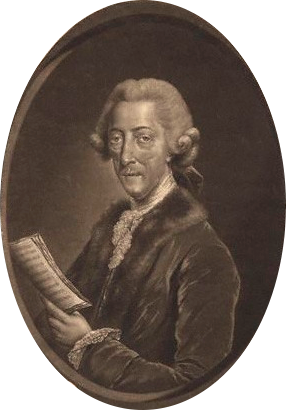
Alfred is a sung stage work about Alfred the Great with music by Thomas Arne and libretto by David Mallet and James Thomson. The work was initially devised as a masque in 1740 and was first performed at Cliveden, country home of Frederick, Prince of Wales, on 1 August 1740 to commemorate the accession of his grandfather George I and the birthday of the Princess Augusta. Arne later revised the work turning it into an all-sung oratorio in 1745 and then an opera in 1753. It is best known for its finale "Rule, Britannia!".
Gennaro Astarita was an Italian composer, mainly of operas. The place of his birth is unknown, although he was active in Naples for many years. He began his operatic career in 1765, collaborating with Niccolò Piccinni in the writing of the opera L'orfana insidiata. He became the maestro di cappella in Naples in 1770.

L'Aiglon is an opera in five acts composed by Arthur Honegger and Jacques Ibert. Honegger composed acts 2, 3, and 4, with Ibert composing acts 1 and 5. A 2016 reviewer described it as "a singular piece of work" with its "blend of operetta, divertissement, conversation piece, historical pageant and, in the disturbingly powerful fourth act set on the Napoleonic battlefield at Wagram, phantasmagoria peopled with living figures onstage and dead voices off".
Demofoonte is a dramma per musica or opera in 3 acts by composer Christoph Willibald Gluck. The work uses an Italian language libretto by Pietro Metastasio. The opera premiered on 6 January 1743 at the Teatro Regio Ducale in Milan.

Didone abbandonata is an opera in three acts composed by Domenico Sarro to a libretto by Pietro Metastasio of the same name which was based on the story of Dido and Aeneas from the fourth book of Virgil's Aeneid. The opera premiered on 1 February 1724 at the Teatro San Bartolomeo in Naples.

Semiramide riconosciuta is an Italian opera with serious action, or dramma per musica, by Nicola Porpora, set to a libretto by Metastasio with some textual changes, possibly by Domenico Lalli. The opera was written for some of the finest contemporary singers, and includes a technically demanding series of da capo arias.
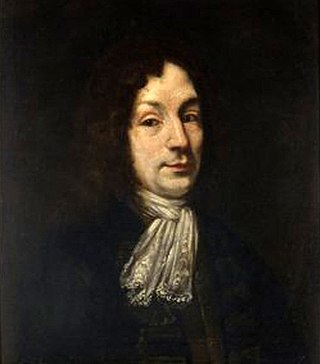
Luca Antonio Predieri was an Italian composer and violinist. A member of a prominent family of musicians, Predieri was born in Bologna and was active there from 1704. In 1737 he moved to Vienna, eventually becoming Kapellmeister to the imperial Habsburg court in 1741, a post he held for ten years. In 1765 he returned to his native city where he died two years later at the age of 78. A prolific opera composer, he was also known for his sacred music and oratorios. Although his operas were largely forgotten by the end of his own lifetime and most of their scores lost, individual arias as well some of his sacred music are still performed and recorded.
Il trionfo di Clelia, Wq. 31, is an opera composed by Christoph Willibald Gluck. It takes the form of a dramma per musica in three acts. The Italian-language libretto by Pietro Metastasio is based on several semi-legendary narratives concerning the founding of the Roman Republic. The opera premiered on 14 May 1763 at the Teatro Comunale di Bologna. Although rarely performed since then, it was revived in London in 2012 at the Royal Opera House's Linbury Studio.

Solimano is an opera in three acts composed by Johann Adolph Hasse to an Italian-language libretto by Giovanni Ambrogio Migliavacca. Loosely based on an episode in the life of Suleiman the Magnificent, the opera premiered on 5 February 1753 at the Opernhaus am Zwinger in Dresden. The lavish production featured set designs by Giuseppe Galli Bibiena. The tenor Angelo Amorevoli sang the title role.

Giovanni Ambrogio Migliavacca was an Italian poet and librettist. A student and protégé of Metastasio, he was primarily active in the court theaters of Dresden and Vienna. His most successful work was the libretto for the opera Solimano, first set by Johann Adolph Hasse in 1753 and subsequently set by eighteen other composers in the following decades.
Auguste Charles Léonard François Vianesi was an opera conductor, born in the Austrian Empire and later naturalised French. His repertoire consisted mostly of French and Italian opera, in which he directed some of the world's great singers including Pauline Viardot, Christina Nilsson, Marcella Sembrich, the brothers Edouard and Jean de Reszke, and Feodor Chaliapin in the opera houses of London, Paris, Melbourne, St. Petersburg, Boston and New York. He retired around the time when sound recording became commercially available, and he seems not to have left any recorded legacy.
Le cinesi is a comic opera by Manuel García to a libretto by Metastasio originally set by Caldara in 1735, but best known in the setting by Gluck of 1754. The opera is one of five chamber operas which the singing teacher composed in 1830 and 1831 for his students, along with I tre gobbi, Il finto sordo, L'isola disabitala, and Un avvertimenlo ai gelosi. The chamber opera was revived for Rossini in Wildbad (2015), and again by the Fundación Juan March in Madrid (2017).













